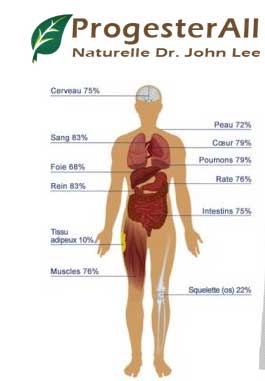
Rétention d’eau à la ménopause : pourquoi ? quoi faire ? (Water retention in menopause: why? what to do ? )
Fluid retention during menopause is a phenomenon known to many women. It is the action of retaining and fixing water in the subcutaneous tissues, especially in the lower limbs. This leads to swelling and water weight gain.
Water retention mainly affects women because certain female hormones – estrogen, aldosterone – accentuate venous circulation problems, one of the causes of water retention. It can get worse during menopause due to hormonal fluctuations, slower metabolism, and cardiovascular problems. But apart from the physiological changes in the body due to menopause, there is a psychological reason that further influences the phenomenon. Fluid retention is a sign of a more or less unconscious state of insecurity and fear. And this mental state can worsen during menopause.
In this article, I take stock of 4 essential sub-themes:
What is water retention, what are the symptoms? How do I know if I am holding water?
What is the difference between water retention and cellulite?
What are the reasons for water retention?
What are the solutions to reduce / eliminate water retention?
What are the symptoms of fluid retention?
The main symptom of fluid retention is swelling:
- calves
- ankles
- legs
- fingers.
If you feel “bloated”, if you have “heavy legs”, “swollen fingers”, for example, you are most likely having fluid retention.
What is the difference between water retention and cellulite?
Cellulite is the storage of fat, not water, in the form of dimples or clumps of fat. It is very unsightly orange peel.
Some parts of the body are better able to store fat, such as the hips, buttocks, thighs, and during menopause: the stomach and arms.
These fatty deposits are additional obstacles to the circulation of fluids in the body.
The human body and the water?
55% of a woman’s body is made up of water. It is a little less than the body of a man (65% water) because of the adipose tissue which is more important in the woman.
The amount of water in the human body depends on several factors. Gender, age, build… For more details, you can consult the CNRS file on this subject.
Inside the body, the water concentration varies from one organ to another: from 1% in the teeth to 90% in the blood plasma. Most of the water is found in the cells and then in the intercellular space. The rest is in the blood and lymph and is constantly circulating throughout the body.
But why do we hold back water?
There are several reasons:
Venous return problem or venous insufficiency: the blood has difficulty returning to the heart so it stagnates in the lower parts. Because of this stagnation, the blood vessels dilate and become more porous. An abnormal amount of water can then escape from the blood to the cells. These become waterlogged and cause the tissues to swell.
Poor lymphatic circulation: water is also transported, in part, by the lymph. Lymph is a yellow fluid secreted from a wound to aid in healing. Unlike the circulating blood pushed by the beating of the heart, the lymph has no pump to help it and is moved by muscle contractions and body movements. If you sit or stay still for too long, you imagine that your lymph will circulate poorly. It then accumulates in parts of the body such as the legs. The water contained in the lymph can no longer go back to the kidneys to be filtered there, and is therefore stored in the cells.
Renal failure, that is to say that the kidney plays its role poorly and is no longer able to filter all the water consumed by the body.
Not drinking enough. The body compensates by storing water. You should know that every day, we eliminate more than 2 liters of water through urine, perspiration and breathing (when exhaling, we reject the air which contains water vapor). In order not to get dehydrated and to keep the body healthy, it is necessary to compensate for the loss of water. Thirst is a mechanism by which the body warns that it is dehydrated. This means that you should drink before you are thirsty, that is, before you start to get dehydrated.
Lack of magnesium. The body needs this mineral for almost all functions. When the body lacks magnesium, it cannot function normally and ends up storing water.
The overconsumption of salt. Sodium, naturally present in the cells of the body, has the ability to retain fluids. Sometimes cells can grow up to 20 times their normal size. Consumed in large quantities, it has Absorbs water excessively and traps it in tissues.
Several medicines for high blood pressure (calcium blockers) as well as some anti-inflammatory drugs containing corticosteroids. In the long term, these treatments can cause a lot of water retention and therefore a considerable weight gain.
Remain standing or sitting for a long time.
The heat.
Genetic.
And finally, one last psycho-energetic reason: fear. It’s the feeling of insecurity and apprehension of the outside world, of the judgment of others… Watch this video in which I explain this particular reason for water retention (click on the image). It is Michel Odoul who talks about it in “Tell me where you hurt”.


